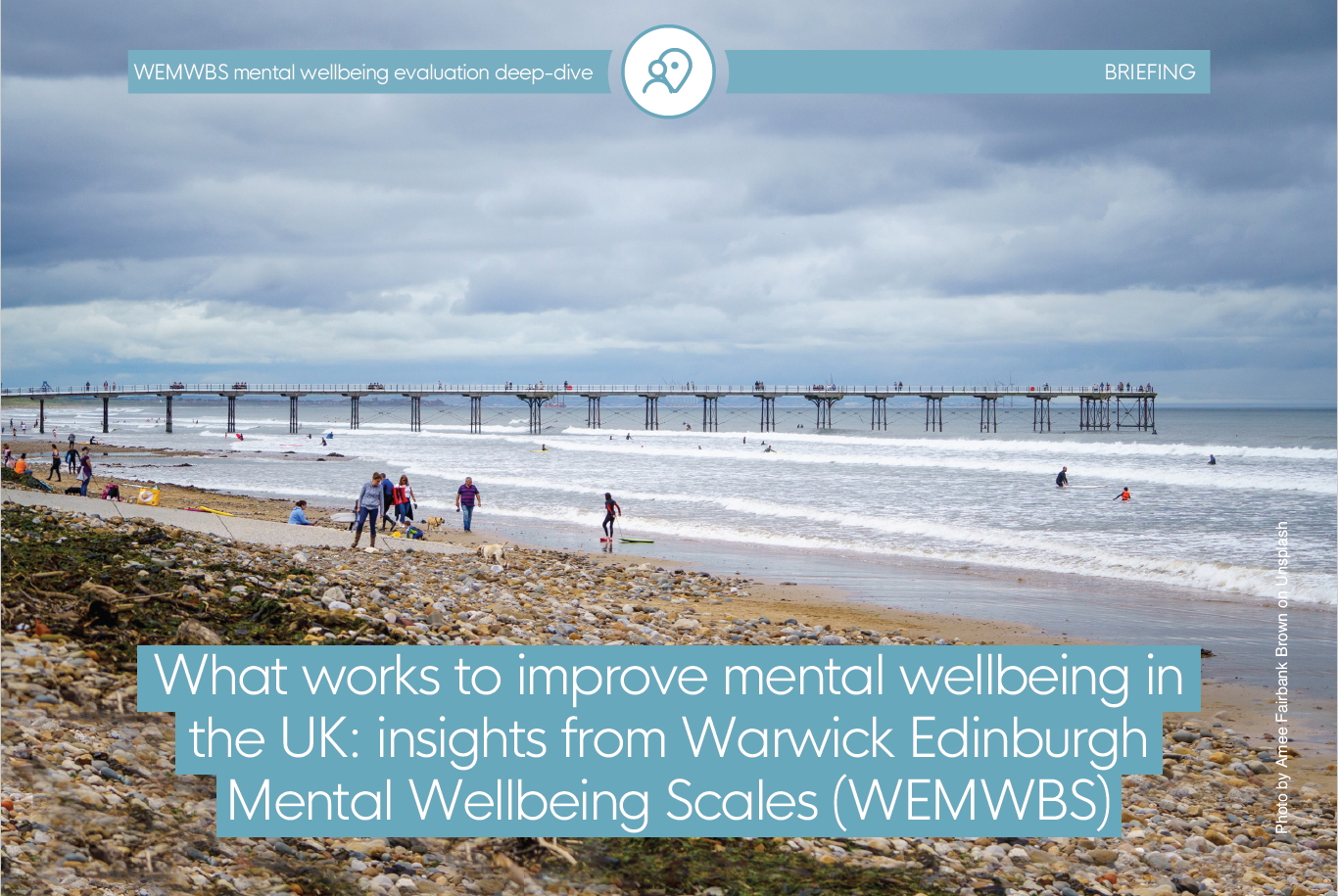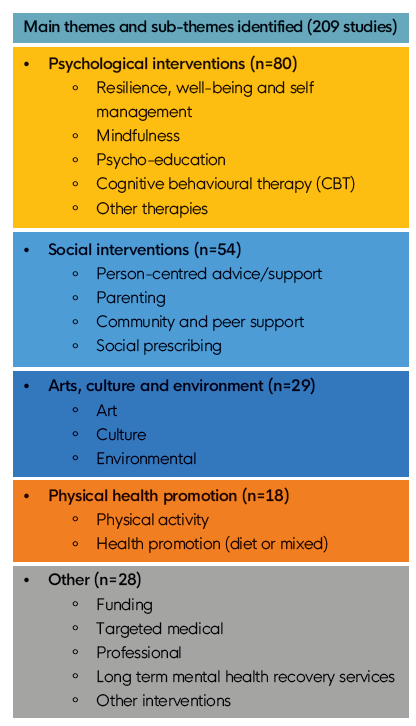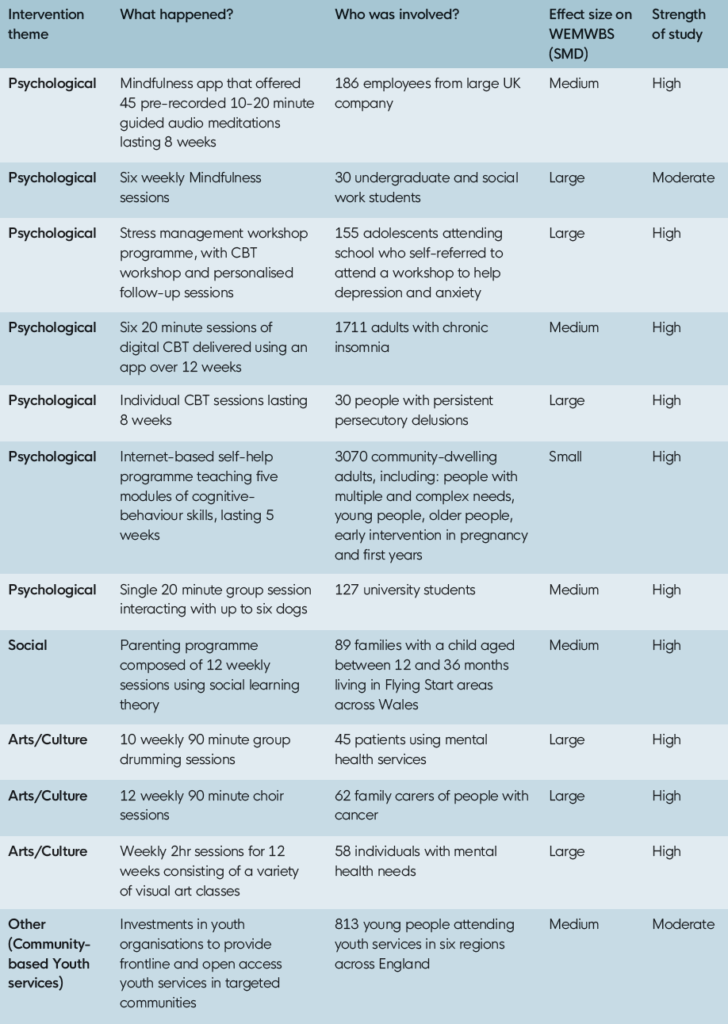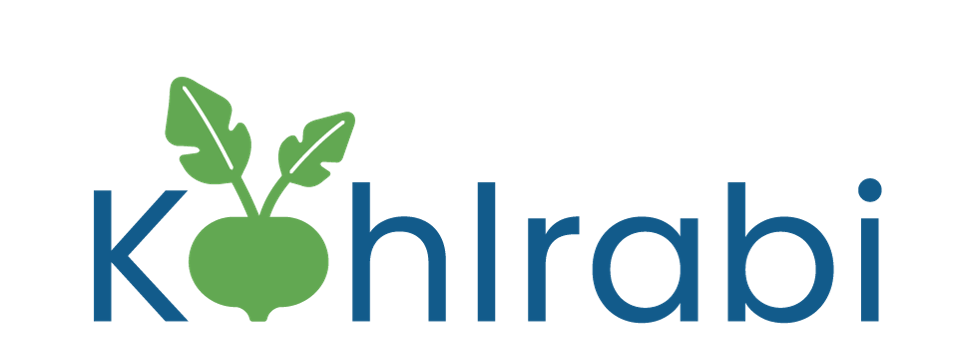What works to improve mental wellbeing in the UK: insights from WEMWBS
Downloads

Introduction
As a What Works Centre we bring together high quality wellbeing evidence to support decision-making and the delivery of more effective and efficient services. We use the UK’s harmonised wellbeing standards to inform our evidence reviews and understand what can be done to improve wellbeing and reduce its inequalities. The national measures within the harmonised standards include subjective wellbeing, mental wellbeing and social capital measures, all of which are commonly used in national and local outcomes frameworks. They help us build a shared knowledge base that uses consistent and comparable wellbeing constructs.
Our Rapid Reviews:
- Explore what is known so far about what works, for whom and in what contexts.
- Illustrate how wellbeing measures are used in different studies so we can support organisations to generate high quality findings.
- Conduct rigorous searches using less extensive methods when compared to systematic reviews, but often searching across grey and published sources.
In 2020, we reviewed evaluations using the ONS4 Personal Wellbeing measures. For this current project, the Centre worked with Kohlrabi Consulting to conduct a 6-month rapid review of UK interventions, delivered from 2007 to the present, that aim to improve mental wellbeing.
The big picture: WEMWBS scales as a key starting point for mental wellbeing
We highly recommend the use of WEMWBS scales in evaluations of wellbeing projects and pilots. As a relatively short scale, the measure views wellbeing as multi-dimensional and possesses strong psychometric properties, population norms and sensitivity to change. In addition, WEMBWS scales are included in UK population surveys, in the UK longitudinal household survey, Understanding Society, and at the devolved level, in the Scottish performance framework, and National Survey for Wales. This provides benchmarks for organisations delivering and evaluating programmes as well as growing opportunities to inform policy at the local and national levels.
Our wellbeing methods series paper from Professor Sarah Stewart Brown, one of the scales’ main developers, highlights the role played by WEMWBS in advancing public mental health practice. The measure has been widely adopted by voluntary and public sector organisations, some of whom have informed its development as a measure of mental wellbeing that is appropriate and sensitive to specific delivery settings.
Findings on what works to improve mental wellbeing
Our review found 209 studies using the WEMWBS scales to evaluate the effects of interventions delivered across public, voluntary, and private sectors. The broad themes for
these studies were:
- Psychological (n=80)
- Social (n=54)
- Arts/Culture (n=29)
- Health Promotion (n=18) and
- Other (n=28)
Over half of the studies we found (115) reported statistically significant improvements in mental wellbeing post intervention. The majority of these were psychological interventions and social interventions.
Interventions that improve mental wellbeing, by theme, 115 studies:


Impactful
- Psychological interventions included: brief online 1:1 guided sessions to improve and educate about resilience, and a peer-facilitated four-week program in prisons;
- Art interventions included: 10-12 weeks of weekly choir, drumming, and a set of mixed visual art sessions.
Promising
- Social interventions included: a whole-family intervention focused on reducing domestic abuse and supporting survivors, children and perpetrators and a peer-led advice service on welfare benefits and health advocacy.
Mixed
- Evidence on VCSE sector funding programmes (5 studies) presented mixed evidence on wellbeing effects for grant programmes focused on healthier lifestyles, community wellbeing, physical activity and diet, and youth services. Health promotion activities and open access youth services were found to have positive effects on mental wellbeing, although none of the evaluations within this subgroup had control groups.
High quality evidence from controlled studies

High-quality evidence from controlled studies. Source: What works to improve mental wellbeing in the UK – insights from WEMWBS
Approach to meta-analysis
The review team developed an approach to meta-analysis to calculate pooled effect sizes on mental wellbeing by intervention theme or subtheme. For most themes, there was substantial heterogeneity, or variability, due to the significant variation between intervention activities, settings and target populations. The following two themes had lower heterogeneity:
- Art interventions (19 studies), which had a large effect size (0.62) on WEMWBS scores, and included activities such as singing, music lessons, textiles, painting, drama classes, photography, fictional audiobooks and stand-up comedy.
- Peer-support interventions (7 studies) which had a small effect size (0.18) and targeted diverse age groups including school-aged children, university students, and older adults.
Methodology
Studies, reports and other grey literature that evaluate the impact of a UK intervention on mental wellbeing for individuals of all ages.
- Used the 14-point or 7-point WEMWBS scales to measure scores as a primary or secondary outcome.
- Used a pre-post design or had a control group.
- Were published in or after 2007 and in English language.
1,452 studies from peer-reviewed and grey literature sources, using formal database searching, Google and website searches and a Call for Evidence to increase the sensitivity of grey literature searches. 209 of these were
included in our review.
For more information, see our research protocol.
Where and how are the WEMWBS scales used
Of the 209 studies identified in our review, the large majority (72%) were peer-reviewed publications and 84% were evaluations of interventions aimed at adults (aged 26-59).
- The most common analytical approach to analyse WEMWBS scores was to calculate and compare means and standard deviations using statistical tests (t-tests).
- Only 35 studies reported WEMWBS scores for subgroups which are useful for analysing the distribution of wellbeing and inequalities in mental wellbeing. The most common subgroups were gender, age and ethnicity.
- Outside of the UK, the WEMWBS scales are used across the world, in studies of interventions delivered in Australia (25), Europe (20), the USA (12) and South Asia – India and Pakistan (6).
Our search strategy wasn’t designed to identify economic evaluations, but we took a closer look at the 38 studies that reported economic evaluation data. The most common methods employed were partial cost-benefit analysis or cost-consequence analysis. Most studies reported data on financial savings using unit costs for sectors such as healthcare and criminal justice and did not combine benefits and costs into a single ratio.
How robust were the findings?
We used the What Works Centre for Wellbeing checklist to appraise the design, conduct and reporting of each study and found that around half of studies were High quality and just
over half scored Moderate.
- Over a third of studies used control groups (37%) and most of these studies used randomisation approaches.
- The most common comparator used by the studies identified in the review was pre-test scores in a pre-post evaluation design.
Implications and recommendations
For organisations providing evaluation support, capacity-building efforts should focus on:
- Increasing the use of suitable comparators, including the use of control groups where possible. This includes supporting organisations to use less resource-intensive robust methods like wait-list controls, or qualitative techniques, such as contribution analysis, to produce credible narratives of change. Where evaluations are commissioned externally, guidance on how to effectively commission the work, can help increase the quality of evaluation designs.
- Improving the quality of reporting, including clearer descriptions of the evaluation methodology used and study findings. Standardised evaluation report templates could be made available, to help ensure greater consistency when describing sample sizes and interpreting results. This may also make studies more suitable for academic publication, where appropriate.
- Analysing the differential impacts of interventions to assess wellbeing inequalities and inform distributional objectives. Depending on the study objective, this could include evaluating and controlling for variables that are associated with wellbeing inequality, including age, gender, and ethnicity.
- Making evaluation guidance a regular and integral part of the support offer. It is unlikely that organisations will be able to adopt more rigorous study designs following one-off training events. In the longer-term, the use of peer-learning approaches and regular feedback on evaluations can help improve the evaluation capabilities of organisations. Free support should be made available via online hubs with a particular focus on support with the theory-building, data collection and report writing stages.
For researchers exploring the evidence on what works to improve mental wellbeing, research should focus on:
Understanding how interventions work. More evidence is needed on the delivery contexts, activities and enablers of change in successful interventions. Reviewing mixed methods and qualitative studies may help locate data on the frequency, type, duration and settings of impactful wellbeing interventions.
Examining promising intervention themes in greater depth. These include:
- Social prescribing
- Community or peer support
- Family wellbeing
- Information and advice
Although the evidence on advice and support interventions was from uncontrolled studies, it showed medium to strong impacts on mental wellbeing. Future reviews should focus on what works in information and support services and can inform the development of interventions that improve health and reduce health inequalities.
Identifying data from economic evaluation, including cost-benefit analysis and cost-effectiveness analysis. This will help compare the benefits of interventions against the costs.
Policy, practice and commission
Provide robust evidence that Cognitive Behavioural Therapy, Mindfulness, and Art-based interventions generate positive effects for mental wellbeing and can be commissioned and delivered where appropriate with a reasonable degree of confidence. Evaluations and further research needs only to be done where it can add to the evidence base, for example:
- Impact for different population groups or contexts
- As part of large trials e.g. multi-armed
- Testing specific elements of delivery e.g. visual arts & mental health delivery mitigation, types of content, reaching participants
- To generate cost effectiveness information
- Where evidence is less strong, commission at the appropriate scale i.e. not a national roll-out or legislation yet, and add to the evidence base through the activity using the recommendations above.
- Where your activity, or evidence informed innovation, doesn’t have any evidence base for mental wellbeing yet start with smaller scale pilots and add to the learning as above.
Suggested citation
Hey N., Musella M., Hvide L., What Works to improve mental wellbeing in the UK: insights from Warwick Edinburgh Mental Wellbeing Scales (WEMWBS) Briefing, May 2022, What Works Centre for Wellbeing.
- Introduction
- The big picture: WEMWBS scales as a key starting point for mental wellbeing
- Findings on what works to improve mental wellbeing
- High quality evidence from controlled studies
- Approach to meta-analysis
- Where and how are the WEMWBS scales used
- How robust were the findings?
- Implications and recommendations
- Policy, practice and commission
- Suggested citation
![]()
[gravityform id=1 title=true description=true ajax=true tabindex=49]


